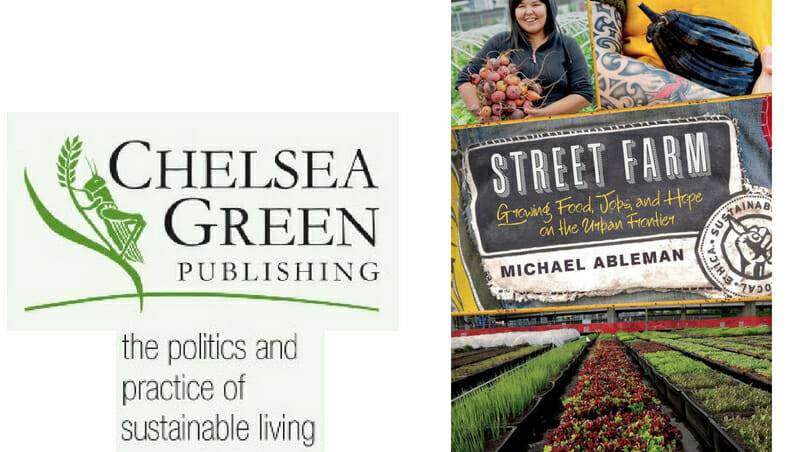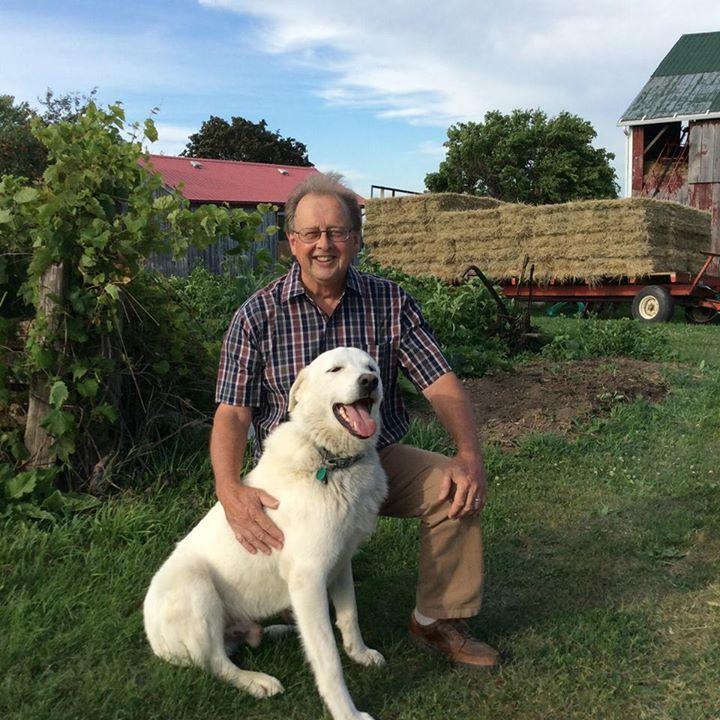Street Farm – Growing Food, Jobs and Hope on the Urban Frontier
By: Michael Ableman
Chelsea Green Publishing, 2016
Paperback, 256 pages
$41.95
Fragility and strength. In Michael Ableman’s latest book, Street Farm – Growing Food, Jobs and Hope on the Urban Frontier, these counterparts stand hand in hand, a testament to the commonalities shared by all living things, plants and humans alike.
Street Farm recounts the struggles and successes of Sole Food Street Farms, an urban agricultural feat (to call it a project would belie the magnitude of this endeavour ) set against the backdrop of Vancouver’s gritty, eastside slums. It is, at its core, a story about people looking after each other. Soil, seeds, plants, and produce play the aptly-assigned role of change agents, offering respite, employment, and a sense of belonging to people far too used to being swept out of sight and out of mind by society.
Ableman is a central character to the plot, one of the two co-founders, along with Seann Dory, that turned an ambitious, some might say crazy, vision into a reality against all odds. And in a seven-year (and counting) odyssey that involves municipal bureaucracy, drug addicts, urban farming, and highly-coveted plots of land in one of Canada’s fastest growing cities, the odds were truly stacked against the two co-founders.
Despite his central role in bringing Sole Food Street Farms to its current status as North America’s largest urban farm project, Ableman rightly places the focus on the story’s true protagonists – the Sole Food employees and the farms.
From heroin addiction to homelessness, from young women to old men, Ableman has carefully crafted the book’s chapters to weave the stories of Sole Food’s ‘farmily’ with those of the farms themselves. For example, Ableman’s first meeting with the benevolent billionaire that would come to be a major supporter of Sole Food, Frank Giustra, is recounted immediately following an introduction to Donna, a former crack user and mother of four that worked on the farm during its early years, but departed during the organization’s difficult growing pains. The juxtaposition between billionaire philanthropist and struggling former drug addict is thought-provoking and jarring.
With a matter-of-fact tone, Ableman details the many setbacks and realities the Sole Food team and its supporters (including city staff, funders, etc.) has had to overcome, from rigid municipal bylaws and land-hungry condo developers, vandalism and kale-loving rats to contaminated lots and no-show staff. The result of the team’s tenacity is five commercially-viable urban farms capable of producing high-quality, artisanal fruits and vegetables to satisfy its customer base of market-goers and chefs at high-end restaurants across the city.
The most remarkable of these farms is the urban orchard that Sole Food opened in 2013. From the beginning, the team faced monumental challenges centred around the need to plant all of the orchard’s trees in containers, lest they need to move the orchard from the vacant lot they leased. Trees aren’t typically suited to container-growing, unlike their vegetable counterparts. Despite many early setbacks, the orchard is now a thriving oasis filled with fruiting trees and herbs, a delight for people and pollinators alike.
With a wisdom and humility that reflect his decades working on social justice agricultural projects across North America, Ableman dismisses any sort of heroic notions the reader might want to attach to Sole Food Street Farms. None of the staff are going to be ‘saved’ by Sole Foods alone and there are no big ‘miracles’ to witness.
 And yet there is no denying that for many of the staff, Sole Food has been an important part of their life’s story. Meaningful work, a reliable source of income, and a sense of community – for those dealing with drug addiction, homelessness, and other challenges, this trifecta is imperative to creating a sense of stability. The farms end up being fertile grounds not only for the growing of produce, but also the growing of people. Many of the employees Ableman profiles have shone bright in the farming environment, discovering or recovering skills and abilities that would any employer would be wont to have in their staff.
And yet there is no denying that for many of the staff, Sole Food has been an important part of their life’s story. Meaningful work, a reliable source of income, and a sense of community – for those dealing with drug addiction, homelessness, and other challenges, this trifecta is imperative to creating a sense of stability. The farms end up being fertile grounds not only for the growing of produce, but also the growing of people. Many of the employees Ableman profiles have shone bright in the farming environment, discovering or recovering skills and abilities that would any employer would be wont to have in their staff.
Though Ableman’s descriptions of the farms and the Sole Food employees are vivid, his use of stunning photography throughout the book bolsters the overall impact. Ableman’s photos are straight-forward and raw, much like his storytelling style. They depict the staffers in their day-to-day work at Sole Food – one (Nova) has a black eye, another (Kenny) a big grin and large bunches of rainbow-coloured beets under each arm. The evolution of each farm – from vacant lot to flourishing farm – is also captured. The images enrich each chapter’s focus, thanks to thoughtful placement of each one.
Ultimately, Street Farm is an impressive achievement unto itself – a compelling chronicle of perseverance in the face of adversity and of human compassion in a concrete city that now has a bit more green in its cityscape and a bit more hope in its Downtown Eastside.












